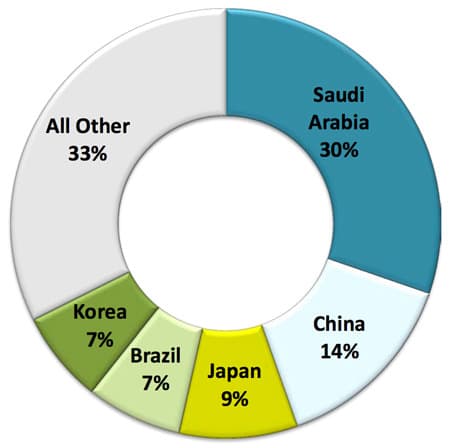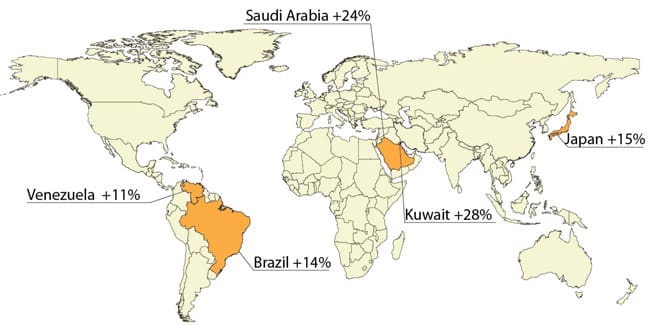Report: Saudi language study in the US to be capped at six months
Every major English-speaking study destination has a keen interest in international student enrolment in its Intensive English Programmes (IEPs). IEPs are both a significant international education segment in their own right, and an important indicator of overall enrolment trends, as many IEP students will continue to further studies in the host country after their language programmes.
IEPs in the United States have seen mostly steady growth since the worst of the enrolment declines that followed the 9/11 attacks in 2001. However, recent changes to scholarship support for Saudi Arabian students, and other forthcoming developments within and outside the US, are creating both new challenges and new opportunities for Intensive English Programmes in America.
Saudi Arabia is currently the leading sending country for IEPs in the US. Since the implementation of the King Abdullah Scholarship Programme (KASP) in 2005, the Saudi government has sent tens of thousands of students to the US, many of which needed extensive English training before being able to undertake university studies.
The Institute of International Education (IIE) reports, "In the 2013/14 academic year, 53,919 students from Saudi Arabia were studying in the United States (up 21% from the previous year), after nine consecutive years of increases. Saudi Arabia is the fourth leading place of origin for students coming to the United States for the fourth year in a row, and is by a wide margin the first among Middle Eastern countries."
According to the IIE’s Open Doors data on Intensive English Programmes in the US, Saudi Arabians numbered at 38,165 which accounted for just over 30% of the total IEP enrolment of 125,973 for 2013 - more than double the number of students from second-ranked China. As the following chart illustrates, two thirds of IEP students in the US come from just five source countries.

Changes in support for language study
It appears, however, that important changes are now afoot in terms of the level of support available for language study. The Saudi Arabian Cultural Mission (SACM) oversees KASP in the US and, in spring 2015, it conducted a review of all IEPs receiving Saudi scholarship students. The immediate impact of the review was that some programmes were asked to adjust their schedules (i.e., days and times of classes per week and total length of programme cycles) and to comply with new requirements for attendance records and reporting. Saudi officials also alerted IEPs to further pending changes to the scholarship programme during the review period. And later in the spring, information began surfacing regarding several substantive changes for new scholarship programme recipients - most significantly, the reported introduction of a new six-month limit on funding for pre-academic language training. SACM has also reportedly introduced an important change with respect to student placement in IEPs. In the past, students could “self-place” in any language programme - that is, those schools that recruited in Saudi Arabia could enrol students who would then obtain the scholarship. However, under the proposed changes all scholarship-supported IEP students are to be placed by the Saudi government. The clear implication is that future KASP recipients will be expected to demonstrate a higher level of English proficiency, and that they will then be placed in American IEPs at the discretion of the Saudi Cultural Mission. Although we were unable to receive official verification directly from SACM prior to publication, frequent reports of these new measures have spread in recent months through communications with Saudi students and between IEP administrators and Saudi officials. Official statements do not speak to the question of funding for language studies, but do highlight the fact that 40,000 scholarships will be provided in the next KASP cycle (Phase III). Media reports indicate that Phase III (applications for which opened at the end of June 2015) will focus on current public-sector employees as well as candidates who have a job offer from a governmental organisation, with the idea that scholarship recipients will have a secured job on their return to Saudi Arabia.
Growth in other markets
While KASP appears to be reducing its support for intensive language study, other markets are stepping up their efforts to build language capacity among their international students.
Kuwait, for example, provides extensive scholarship opportunities. While the Kuwaiti numbers come nowhere close to the top-ranked Saudis or Chinese, the small, oil-rich nation ranked seventh in population counts in the 2013 IIE Open Doors data. Kuwait was by far the fastest-growing source market for US IEPs that year, far exceeding any other country, with growth of 54.8% from 2012 to 2013.
When looking at 2013 to 2014 growth, Kuwait registered a 28.2% increase in the number of students enrolled in intensive English programmes in higher education. Meanwhile, as the map below shows, intensive English enrolments were up from other nations as well.

















